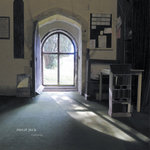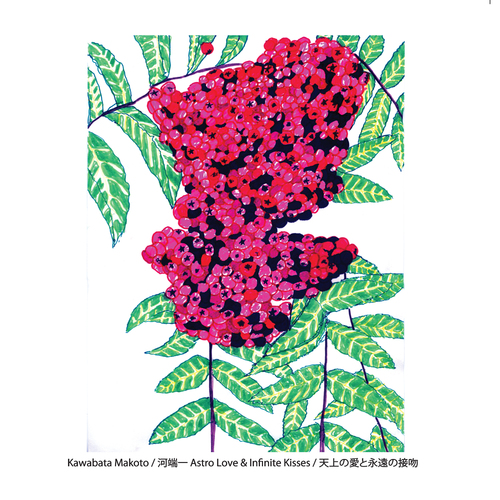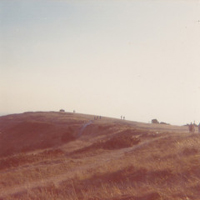- Administrator
- Albums and Singles

"... and they sparkled like burnished brass"
"Out of the depths of our complaints, it could be all so simple. To be never fooled by the finesse of a long-yearned for solidity, but in the momentary aplomb of a sleepy walk threading through familiar streets we'd hum our way, alto, baritone and tenor toward some harmonious end. An effect like some wonderful recollection of one or other of those technicolour movies. Not real for sure, but if you are in the mood… [...] (Philip Jeck, April 2015)
"To make this record I used Fidelity record players, Casio Keyboards, Ibanez bass guitar, Sony minidisc players, Ibanez and Zoom effects pedals, assorted percussion, a Behringer mixer and it was edited it at home with minidisc players and on a laptop computer."
More information will soon be found here. Out October 23rd.
Read More
- Administrator
- Albums and Singles

An colossal audiovisual adaption of Marinetti’s Futurist Manifesto, by one of the uncontested master isolationists of the ethereal static sounds, a sonic symphony of the unconsciouss and a defiant decceleration critique of today society through the ultimate modern text. Thomas Köner has crafted the ultimate 4 bpm masterpiece.
More information can be found here.
Read More
- Administrator
- Albums and Singles

Spherical collections of stars form around black holes in situ; that is, locally to their cosmic neighbourhoods. It is said that future space colonization will rely on sourcing supplies in situ. Construction in situ uses raw materials at the site: colossal sculptures such as Naqsh-e Rustam, the Leshan Giant Buddha and Mount Rushmore were built in this fashion.
Wild, organic machine grooves, with a mind’s eye on naked treetops and an early sunset. Melody breathes out from dubwise fx, percussion by turns sinewy and floating, sub blasts and stripped synth arrangements. Keys on air.
Spacious, witty, melancholic, deadly.
More information is available here.
Read More
- Administrator
- Albums and Singles
Astro Love is the first widely available solo release in several years from Kawabata, emerging from a period of relative quiet with this blockbuster Krautrock-flavored epic. On the whole, this a lovely and impressionistic record, the other side of Makoto's outrageous works with Acid Mothers' Temple. Taking cues from classics of the genre like Tangerine Dream’s Phaedra and Steve Hillage's Rainbow Dome Music, "Dos Nurages" is the centerpiece of the record, a 41-minute hypnotic epic, with echoplex’d guitar anchoring a stream of expertly done glissando. "Astro Love & Infinite Kisses" is a darker drone, in the traditions of Kawabata’s INUI series of releases for VHF. "Woman From Dream Island" finishes the record with a thick buzz of tamboura overlaid with trippy backwards guitar, before giving way to a gentle finger-picked acoustic coda.
More information can be found here.

Read More
- Administrator
- Albums and Singles
Astro Love is the first widely available solo release in several years from Kawabata, emerging from a period of relative quiet with this blockbuster Krautrock-flavored epic. On the whole, this a lovely and impressionistic record, the other side of Makoto's outrageous works with Acid Mothers' Temple. Taking cues from classics of the genre like Tangerine Dream’s Phaedra and Steve Hillage's Rainbow Dome Music, "Dos Nurages" is the centerpiece of the record, a 41-minute hypnotic epic, with echoplex’d guitar anchoring a stream of expertly done glissando. "Astro Love & Infinite Kisses" is a darker drone, in the traditions of Kawabata’s INUI series of releases for VHF. "Woman From Dream Island" finishes the record with a thick buzz of tamboura overlaid with trippy backwards guitar, before giving way to a gentle finger-picked acoustic coda.
More information can be found here.

Read More
- Administrator
- Albums and Singles

King Midas Sound is comprised of Kevin Martin (also known for his work under The Bug moniker), singer/poet Roger Robinson, and vocalist Kiki Hitomi. Their landmark 2009 debut Waiting For You on Hyperdub quickly established them as falling sonically somewhere between sub-electronic lovers' rock, dub and the bleakest, slowest mutation of narco hip-hop, while on the live front they were nestled somewhere between the apocalypse and FX-drenched, shoegaze laments. In both arenas they are known as a brooding sonic force. With a move over to Ninja Tune plus the release of 2013's lauded Aroo single and in particular its b-side "Funny Love," an even deeper sense of spaciousness began to set in. That track’s dramatic tonal shift acted as a catalyst for the idea of a conceptual collaborative project to be born. Hence this first edition (in a series of four), appropriately titled Edition 1.
Looking even further back it does seems fitting that the person (Kevin Martin) who once curated a compilation called Isolationism is one of the key contributors behind this truly mesmeric examination of melancholy and desolation, Edition 1 features collaborator number one, Austrian guitarist / electronic musician Fennesz. His 2001 album Endless Summer was a swirling mix of electric tonal guitars and sweeping emotional shifts which inspired and sparked an admiration within Kevin and Roger to bring him onboard. Utilizing improvised guitar tracks, samples, and unreleased material from Fennesz's archive, Edition 1 took shape within the KMS framework. In the wake of Kevin's last Bug album Angels & Devils, he wanted to create a record focused on kaleidoscopic sonic beauty, bathed in the bluest emotional lyricism. This record reflects the group’s past, present, and a truly extraordinary future.
Edition 1 is a tide coming in. A fog reaching out into nothing, and encapsulating everything. An ultimate parting note drifting into absolute loneliness, swept up in a sumptuously blurred, dronal haze. Hallucinatory tone poems of heartbreak, despair, disappearance, and displacement. Seductively spatial sketches of long goodbyes. Music to cling to or to be used to move past. Sounds set adrift on their own tonal plain and reigned back in by Roger & Kiki's complimentary, yet extremely different deliveries. Cosmic blues meets a siren’s song. A zonal re-examination of "It's Raining Today" or an audio representation of a Sugimoto "Seascapes" photo... A high water mark forever etched to memory.
More information can be found here.
Read More
- Administrator
- Albums and Singles
 Blood Room has only a handful of releases under that moniker, but the sound of Chroma and Coda is that of a confident, self-assured electronic artist. Hints of the early 1990s and the dawn of techno appear throughout, but with an appropriately dissonant, experimental bent to keep it sounding fresh and contemporary.
Blood Room has only a handful of releases under that moniker, but the sound of Chroma and Coda is that of a confident, self-assured electronic artist. Hints of the early 1990s and the dawn of techno appear throughout, but with an appropriately dissonant, experimental bent to keep it sounding fresh and contemporary.
Duality places a notable role throughout the eight songs on this tape.Blood Room builds most of these songs from conventional rhythms and melodies, but never in an expected way.Instead, he blends those expected moments with bizarre, processed noises and random bits of sound.The relaxed kick drum lead rhythm of "Rite in the Rain" (a collaboration with SOLO1) is treated with just the right amount of distortion and processing to keep it from sounding too conventional.Hints of melody glide through but only fleetingly, and everything has a satisfying analog crunch to it.
"Colourism" is similar, though with a more erratic, but cleaner rhythm program driving it.It has a similar combination of conventional pacing, but mixed with weird synth outbursts and strange processing to give it an entirely different edge."Sapir" thuds away with a 4/4 bass drum rhythm, but bathes everything in a nice variety of reverbs, and mixes cleaner melodic leads with bits of chaos and static to excellent effect.
The stranger moments are frequent as well.Blood Room strips down to bare essentials on "Alfven," with a light synth lead coupled with a rhythm that sounds as if it were constructed with the tiniest fragments of human voice.For all its odd instrumentation, it is a surprisingly relaxed piece."Steen" may be the tape's highpoint for me, however.Skittering noises, big beats, and dark synthesizer work form the foundation that bizarre sounds are cast atop, coming together as a taut, strongly composed piece of music that is wonderfully unconventional, but still has a great memorable rhythm to it.
Blood Room's sound may be influenced by those early days of techno and its variety of offshoots, but their unconventional approach to the sounds and how they are mixed is what gives the Chroma and Coda a distinct identity.There might not be big danceable beats, but it is the obtuseness that makes this an excellent work.
samples:
 
Read More
- Administrator
- Albums and Singles
 This debut release from the duo of Nicol Eltzroth Rosendorf and Retconned is shrouded in mystery and ambiguity. The four pieces that make up this cassette EP are of unknown sources, but obviously processed and reformed to bear no resemblance to their initial forms. The final product, however, is a brilliant suite of sparse, yet complex compositions that benefit greatly from their haziness.
This debut release from the duo of Nicol Eltzroth Rosendorf and Retconned is shrouded in mystery and ambiguity. The four pieces that make up this cassette EP are of unknown sources, but obviously processed and reformed to bear no resemblance to their initial forms. The final product, however, is a brilliant suite of sparse, yet complex compositions that benefit greatly from their haziness.
The first half of the cassette focuses more on the understated end of Scratched Glass' style."Prop" stays low and delicate throughout.What resembles the dying tinges of guitar feedback echo in the distance, resulting in a ghostly piece of music.While the sound becomes somewhat more intense in its closing moments, Rosendorf and Retconned do an exceptional job of building dramatic moods with little sound."Attic Bed" is constructed from a similarly stripped down kit, but has a more dissonant quality to it.Bass synth like rattles and abrasive noises cut through, until they sneak a bit of melody into the otherwise noisy space.
The sound of the second half of the tape is a bit more commanding and forceful in comparison."Stage" consists of overdriven drones that sustain and shimmer dramatically, as a counterpoint of massive rumbling balances out the spectrum.As a whole, the piece builds to a dramatic crescendo, and then stops abruptly, giving Rosendorf and Retconned a chance to rebuild the piece from the debris that remain."Mirror" sees the duo returning to that massive low end bass sound, with an overall busier and more active piece.Dramatic string-like sounds build tension, and the composition keeps a consistent tone throughout.
Considering this looks to be the project's debut work, one is a rich and diverse piece of music.Scratched Glass' expertise in balancing nuanced, subtle passages of sound with aggressive, forceful, foundation rattling moments shines through clearly.Where these two pulled these sounds from may be a mystery, but their ability to shape and mold them into rich, strong pieces of sound art is unquestionable.
samples:
 
Read More
- Administrator
- Albums and Singles
Fifth in a series of recordings made by Autumn Richardson & Richard Skelton for the Furness Fells of south-west Cumbria, UK:
"Sympathetic resonance: a vast stringed instrument made in honour of J.F. Glidden, tuned to esoteric frequencies. Fine thread-like fibres. A holy triad: Raven’s Crag. Fox Haw. Brock Barrow. Memorious Earth. Land-music. A poultice to remove proud flesh."
More information is available here.

Read More
- Administrator
- Albums and Singles
Calluna is the second collaborative release from Andrew Chalk & Tom James Scott, and was completed following the duo's first live performance in summer 2014. Recorded over a longer time period than Wild Flowers (2013), Calluna sees the haze of their debut lifted to reveal a clearer, more expansive sound world. Scott's sparse unadorned piano notes occasionally cluster into more elaborate, decorative phrases, delicately underpinned and enhanced by Chalk's slow, carefully placed additions.
Edited from an extensive collection of material by the two, Calluna is presented here as a 12" mini-album cut at 45rpm by Noel Summerville, and packaged in a full colour offset printed sleeve featuring artwork by Tom James Scott. Edition of 500 copies.
More information can be found here.

Read More
- Administrator
- Albums and Singles
Drew McDowall’s back story reads like a primer of psychedelic fiction woven into statements of the unbelievable, superhuman and outright insane. Somewhere in the chaotic madness, comes an artist such as McDowall with total control and absolute calm within his songs and artistic method.
Growing up in the gangs of 1970’s Scotland, Drew McDowall started to shy away from the daily violence once punk took hold of the counterculture youth. Drew McDowall quickly scrambled to form his own punk band in 1978 with his then wife, Rose McDowall, called The Poems. Shortly lived, the Poems released a single and various tracks but more importantly, the band allowed McDowall to network with other local musicians in Glasgow, such as Orange Juice, and allowed him to travel down to London thus forming friendships with Genesis P-Orridge, David Tibet and countless others, bringing Drew into the fold of the experimental revolution happening in the UK brought upon by Throbbing Gristle and executed by bands such as Psychic TV and Current 93.
During the 1980’s, McDowall found himself in the ranks of P-Orridge’s Psychic TV and collaborating with the mysterious duo comprised of former Throbbing Gristle creator Peter ‘Sleazy’ Christopherson and the enigmatic John Balance who had been creating esoteric and progressive electronic music under the title of Coil. It was during his formative collaborations with Coil that McDowall saw himself shift from occasional contributor to austere full-time member of the arcane outfit. McDowall’s impact on the band’s sound was apparent as the releases transformed from their previous avant pop signature to a more complex and methodic electronic imprint accompanied by even more abstruse subject matter than previous years. McDowall would continue honing his compositional skills with Coil until the release of the band’s two most broad-minded albums, Astral Disaster and Musick to Play in the Dark.
Dais Records approached Drew to solidify his standing as a leading electronic musician with the recording of new material neatly wrapped up in his debut album entitled Collapse. Recorded in 2015 in Brooklyn, NY, McDowall’s synonymous modular synthesizer compositions are augmented by obtuse sampling cut-ups and contributions from Nicky Mao (Hiro Kone / Effi Briest) rounding out the lumbering sequential knot work that has become synonymous with McDowall and craft.
More information can be found here.

Read More

